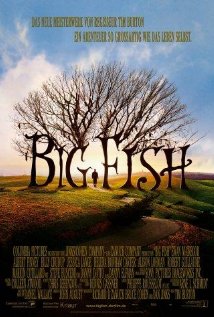Tags
Baptism, Bible, Big Fish, catechesis, Catholic, death, Edward Bloom, Ewan McGregor, Fantasy, ministry, movie, movie ministry, oscars, Scripture, Story, Storytelling
 Young Ed Bloom: There are some fish that cannot be caught. It’s not that they are faster or stronger than other fish, they’re just touched by something extra.
Young Ed Bloom: There are some fish that cannot be caught. It’s not that they are faster or stronger than other fish, they’re just touched by something extra.
Will Bloom: That was my father’s final joke, I guess. A man tells his stories so many times that he becomes the stories. They live on after him. And in that way he becomes immortal.
Albert Finney and Ewan McGregor both play Edward Bloom in this mix of fantasy and reality that leaves you wondering what was really true and what wasn’t. Edward is dying, apparently far enough along that his son Will (played by Billy Crudup) has come to be with him. Will thinks his Father’s stories are all tall tales (or at least not “short ones” as Edward says), each one more extreme than the last. The viewer is flipped back and forth between Edward’s deathbed and flashbacks to his youth up through adulthood.
I honestly still don’t know if I fully “get” Big Fish, but I really like it and watch it on a regular basis. It’s a beautiful film and watching it (more specifically the stories Edward tells) remind me of all those far out bible stories we’re taught from the time we’re kids. Sometimes, I identify more with Edward – that the stories are necessary, something to draw attention to an otherwise boring event. But sometimes, more often than I’d like to admit, I find myself identifying with Will, saying “just get to the point.” There’s even an exchange where Will hears the real story of the day he was born from Edward’s doctor. Will comments that he likes the boring version, but even the doctor says if he had the two stories to choose from, he’d pick the elaborate one.
So, let’s be honest. How many of us find ourselves identifying with Will? Do we want God to just get to the point? Do we doubt what God is telling us – either in Sacred Scripture or in our lives? How do we deal with it? Have we had any experiences that might make us lean a little more to Edward’s side? Will thinks his Dad tells these stories to steer attention to himself. Since the primary event that splits the two is Edward’s toast at Will’s wedding, is it so much that Edward steers to attention to himself, of that Will feels like he’s not the center of things? How does that relate to us? And when we identify with Edward, what is it about him that we identify with?
This is also a good time to reflect on some of those bible stories we think are pretty impossible. Did Moses really live to be 120 years old, or was that just an issue of calendars? What about Jonah and the whale? Would we have paid attention to the birth of a savior without all the angels, shepherds, wise men and a death threat? Do we think these stories are a case of poetic license or a statement of fact? And, if you see it as fact, then what about the stories with differing details? Or do the details really matter?
As Edward is dying, he keeps saying “That’s not how I go.” He supposedly saw his death in a witch’s eye when he was a child. Does he really know how he goes or is it just his way of reassuring everyone? What do you make of it? If you knew how you would go, would it reassure you, or scare you?
What about the reoccurrence of water? And Edward’s statements that he’s thirsty – or drying up? Can the water have a reference to baptism? Is his thirst physical or spiritual? What sort of case can you make for each?
What or who are the big fish in our lives? Do we bait it / them with gold or something else? Edward finally catches his fish, but he lets her go. What do you make of that? Could Edward letting the fish go be equated with God’s Mercy somehow?
What story or stories would you want to be remembered for? What story should you tell your children – or remind them of? What happens when you tell or retell your stories? Do your listeners believe you? Do you have storytellers in your life? What sort of stories do they tell? What role does storytelling have in passing on our faith?
As you can see this is a film that leaves us with more questions than answers (even without my spin on things). There’s just enough truth to everything that you just don’t know what all to believe (like when Will finds the deeds to Spectre and the visitors at Edward’s funeral). All we really know is that Edward Bloom is a social person and Big Fish is full of stories! I guess the final question is, “Does it matter?” I’m still finding things (possible meanings, glimmers of meditations and ideas for discussion) in Big Fish – and somehow like Edward’s stories, I think there will be plenty here to think about for a lifetime!
It is rated PG-13 for some brief scenes involving nudity although not sexual. There is also a headed exchange between Will and Edward – and one sexual reference, so if watching with a young audience, you will definitely want to preview it first… but on the whole, it’s a fantasy with adventure, laughs and drama and Tim Burton’s classic style of cinematography.
For more info, check out http://www.imdb.com/title/tt0319061/
